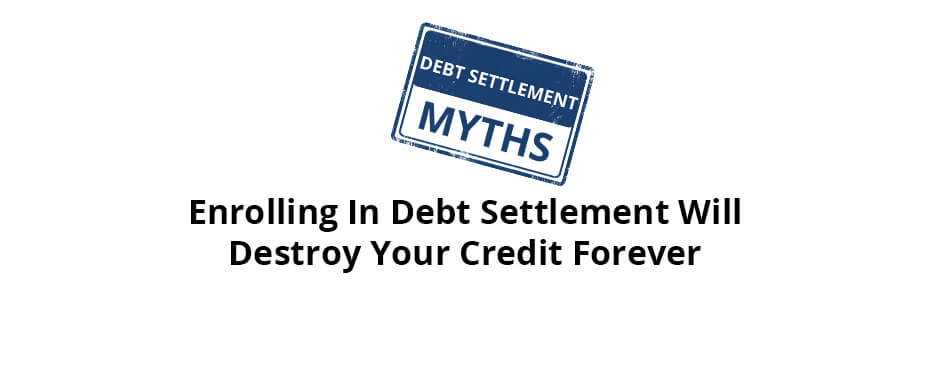Myth: Enrolling in Debt Settlement Will Destroy Your Credit Forever


Key Takeaways
- Credit is only one of several factors lenders use when making credit decisions.
- When you have few borrowing needs, a temporary lower credit score will have little impact on your daily life.
- You can take proactive steps to limit the negative impact of enrolling in a debt settlement program.
Reality: While you will experience an initial decline in your credit score, it is temporary. Unless you plan to finance a new home or vehicle, you will likely see little impact on your life during the short time you have impaired credit.
What Your Credit Score Really Measures
Lenders put credit at the forefront, making consumers believe it is the end-all and be-all of getting a loan. This simply is not true. Lenders consider many factors, including your credit,in the underwriting process.
Credit scores only track your payment history and debt levels. It does not measure your financial strength, income levels, job qualifications, or net worth.
How Companies Calculate Your Credit Score
There are two parts to your credit, your credit report, and your credit score. Your credit report is an accounting of how you pay your loans with information reported directly from lenders. Data includes a seven-year payment history, account balance, credit limit or highest balance, and the amount paid each month. Credit scoring companies, like FICO, use this data to tabulate your credit score, which represents your risk to a lender.
Because of the increased emphasis on credit, consumers have become obsessed with keeping a high credit score, even if it causes further financial hardship.
What Factors Matter Most in Your Credit Score?
FICO uses five primary behaviors in determining your score. These include:
- Payment history for seven years
- Credit limits to credit balance ratio also called utilization ratio
- The mix of loans and lines of credit
- Length of credit history
- New credit
The two most important are payment history (35%) and credit utilization (30%). Being overextended with high debt and maxed out credit cards weighs almost as much as a missed payment. If you have high levels of debt or previously missed payments, an additional default will have less impact than if you have excellent credit before enrolling.
The good news is that even with debt settlement, you can quickly recover from the decline, limiting the adverse effects of a lower credit score.
How Debt Settlement Will Affect Your Score
Lenders look for signs of financial hardship. Late payments on an account area key consideration when deciding if and when the company will accept a lower payoff. Once enrolled in a debt settlement program, you should stop making payments to enrolled accounts and redirect some of those funds into a program savings account. This strategy confirms your financial hardship and allows you to save enough money for a settlement.
The missed payments will cause a temporary decline in your credit score.
Steps You Can Take for Faster Credit Recovery
Maintain credit accounts by leaving at least one open account while in debt settlement. Your mortgage or car payment could help you rebuild your credit, provided you remain current.
Accelerate debt payoffs when possible. Over funding your program savings account can speed up your debt settlements and accelerate credit recovery. In some cases, the creditor will remove the account from your report after payoff.
Avoid new debt while in the program. Opening additional credit accounts could make it harder to get out of debt and slow your credit recovery.
Add alternative data to your credit file. Lenders are increasingly accepting alternative data, which allows you to self-report payment history from cell phone bills, utilities, and rent payments.
Final Thoughts
When you do not have an immediate need to borrow money, a lower credit score will have a minimum impact on your daily life. Then, after debt settlement, when you do need access to credit, you will have improved your finances to a point where lenders are willing to approve your application.
FAQ

REPRESENTATIVE EXAMPLE OF APR
If you borrow $30,000 over a term of 5 years (60 months) with an APR of 4.99% you will pay $566.00 each month. The total amount payable will be $33,959.97, with total interest of $3,959.97.
ANNUAL PERCENTAGE RATE (APR)
Annual Percentage Rate (APR) represents the annualized interest rate you are charged for borrowing. It is the combination of the nominal interest rate and some additional costs such as fees involved when incurring debt. Our lender offers APRs for personal loans, cash advance loans, installment loans and debt consolidation loans from 4.99% to 35.99%. Since New Start Capital does not directly issue loans, we cannot deliver any specifics or guarantee the APR you will be offered. The APR depends solely on your lender’s decision, based on various factors including your credit score, credit history, income, and some other information you supply in your request. For more information regarding the APR contact your lender.